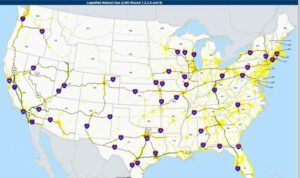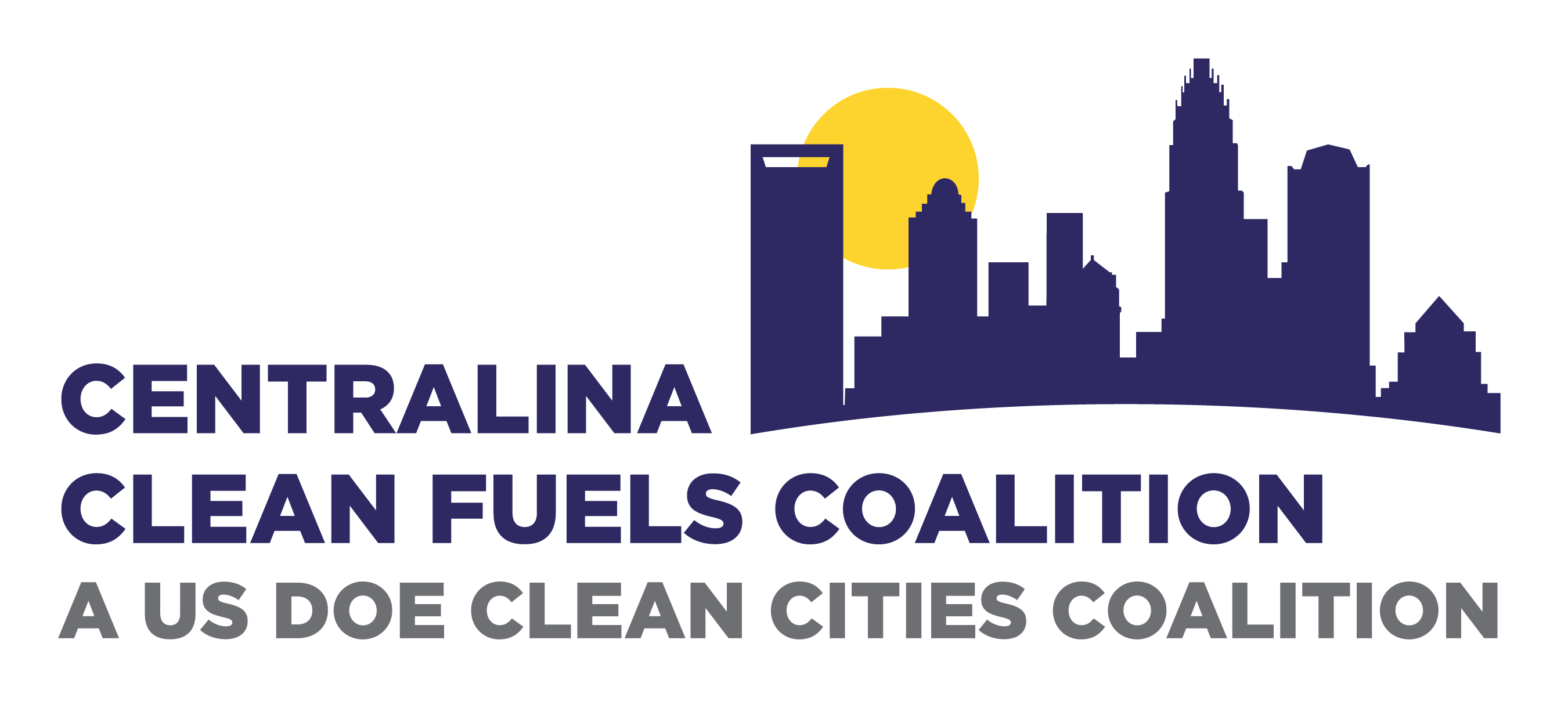Plug-in NC’s recent article, “How Alternative Fuel Corridors Help Shape Electric Transportation In North Carolina and Beyond,” shares the perspectives of Jason Wager (Centralina Clean Fuels Coalition), Annie Lee (Triangle Clean Cities Coalition) and Sarah Nichols (Land-of-Sky Clean Vehicles Coalition) on all things electric. Answering questions like why do Alternative Fuel Corridors matter for EV drivers? And how does this work prepare North Carolina for the future of EVs? This article is the perfect read for anyone wanting to learn more about Alternative Fuel Corridors.
Read the full article here.
Also check out the CCFC Regional EVSE Planning Page and Regional EVSE Funding Map for a quick look at Alternative Fuel EV-Ready Corridors in the CCFC region.
The Centralina Clean Fuels Coalition acknowledges there are currently a multitude of local and national funding opportunities for EVSE and other alternative fuel infrastructure available, with more programs slated to become available in the coming months. It can be difficult to keep track of the variety of funding programs available and understand which opportunities your community or organization may be able to participate in. To address this situation, Centralina has developed a region-specific EV Infrastructure and Funding Dashboard to serve as a one-stop resource for communities, organizations and businesses to identify available funding opportunities.
Our regional EV Regional Plan Update Flyer can help you learn further about funding sources and how to prepare your community. To view this plan and understand how Centralina is developing resources that support planning and funding activities on a regional level view the page here.
By working with stakeholders, the N.C. Department of Transportation has developed plans and strategies to reduce transportation emissions. These include the Zero Emission Vehicle Plan, Multi-State Medium- and Heavy-Duty ZEV Memorandum of Understanding, and the Vehicle Miles Traveled (VMT) Reduction Study.
As a part of the development process, five work groups were created to gather stakeholder input. These work groups can be found here and include
 The National Electric Vehicle Infrastructure Formula Program (“NEVI Formula”) was created to provide funding to States to strategically deploy electric vehicle (EV) charging infrastructure and to establish an interconnected network to facilitate data collection, access, and reliability. Providing nearly $5 billion over 5 years ending in 2027, the NEVI Formula provides funds to build out alternative fuel corridors.
The National Electric Vehicle Infrastructure Formula Program (“NEVI Formula”) was created to provide funding to States to strategically deploy electric vehicle (EV) charging infrastructure and to establish an interconnected network to facilitate data collection, access, and reliability. Providing nearly $5 billion over 5 years ending in 2027, the NEVI Formula provides funds to build out alternative fuel corridors.
 Funding is available for installation of network-connected public chargers, or non-public chargers that serve more than one company. Operation and maintenance of the charging system as well as additions that lead to overall lower construction and operating costs are also considered eligible costs to be funded by NEVI Formula funds.
Funding is available for installation of network-connected public chargers, or non-public chargers that serve more than one company. Operation and maintenance of the charging system as well as additions that lead to overall lower construction and operating costs are also considered eligible costs to be funded by NEVI Formula funds.
 Alternative Fuel Corridors
Alternative Fuel CorridorsThese corridors include several interstate highways, federal and state roads and were established through nominations from state and local officials with stakeholder input. Along the National Highway System, alternative fuel corridors are a national network of alternative fueling and charging infrastructure.
With a goal of transitioning to zero-emission fleets, we know change takes time. While your fleet converts, other methods of fuel conservation can help to reduce emissions and save on costs too. Visit the CCFC Fuel Conservation Resources page to find easy and immediately implementable tips and practices.
 For additional information or questions, please contact Megan Upchurch, Regional Planner at mupchurch@centralina.org.
For additional information or questions, please contact Megan Upchurch, Regional Planner at mupchurch@centralina.org.
The Alternative Fuels Data Center has recently released an eight piece series surrounding electric school bus education. The series has been named “Flipping the Switch on Electric School Buses” and features handouts and recorded webinars. The series is catered towards K-12 schools and school bus fleets that are interested in implementing electric buses. Each part of the series focuses on a different fleet consideration for electric school buses.
The entire series can be watched as a whole step-by-step guide through the process, or you can focus on the topics that meet your specific fleet’s needs and concerns. The eight parts include:
Additionally, the EPA and the DEQ have funding opportunities to assist in the cost of making the switch from old buses to new low- and zero-emission buses. The main website is available here: https://www.epa.gov/cleanschoolbus and applications are now open!
For more information on funding opportunities or questions, please contact Megan Upchurch, Regional Planner at mupchurch@centralina.org
Happy Earth Day 2022! Here at the Centralina Clean Fuels Coalition, we value the importance of Earth Day and what it means to participate in protecting and appreciating our Earth. Recently, the CCFC published resources for fleets to look towards when trying to conserve fuel as a way to save money and cut back on petroleum dependence. We encourage fleets to check out these resources this Earth Day to see how your fleet can make an impact.
Check out that page here. Which includes fuel conservation tips like;
With fuel costs and inflation keeping prices high, CCFC staff have compiled a list of fleet resources on fleet fuel conservation.
As a basic rule of thumb, turn off your engine whenever possible. Idling uses a considerable amount of fuel,; an average medium, heavy-duty truck consumes approximately 0.84 gallons per hour while idling. However, some vehicles require idle time while operating. So, in these scenarios, there are technologies available that can help reduce fuel consumption during the idle period. Listed on this resource are various technology options for light-, medium-, and heavy-duty vehicles. The table at that link also lists the percent emission reduction associated with the technology as recognized by the EPA.
Additionally, Argonne National Laboratory’s idle reduction worksheet can help guide the process of calculating savings when considering the switch to an idle reduction technology.
Though it might seem obvious, it is important to remind fleet drivers of the basic tips & tricks to conserve fuel. Remind drivers to slow down and drive consistently, as speeding increases fuel consumption and decreases fuel economy. When planning routes or deliveries, combine trips and reduce vehicle load whenever possible. By avoiding unnecessary stops and reducing your vehicle load, you can maximize the vehicle fuel consumption.
Keeping your vehicle in shape-such as by correcting tuning issues- can improve gas mileage by an average of 4%. Additionally, keeping tires inflated to the proper pressure can improve gas mileage from anywhere between 0.6% and 3%.
General easy to follow tips may include: accelerating gently, coasting to decelerate, use air conditioning sparingly, and attempt to plan routes ahead including fuel stops to avoid unnecessary stopping.
The US Department of Energy released their latest case study on Connected and Autonomous Vehicles and the Centralina Clean Fuels Coalition was a featured participant. Our workshop series from 2017, Roadmap from 2018 and next steps are all included in the article you can read here.
